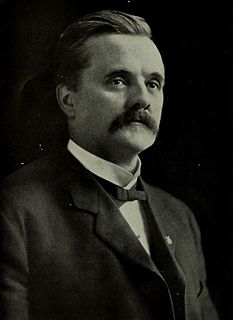A Quote by John Yoo
I believe that the power to declare war is most important in limiting the powers of the national government in regard to the rights of its citizens, but that it does not require Congress to give its approval before the president uses force abroad.
Related Quotes
I believe that the power to declare war is most important in limiting the powers of the national government in regard to the rights of its citizens, but that it does not require Congress to give its approval before the president uses force abroad. I do not believe that the framers of the Constitution understood the power to declare to mean "authorize" or "commence" war. That does not mean that the separation of powers or checks and balances will not work.
No power but Congress can declare war; but what is the value of this constitutional provision, if the President of his own authority may make such military movements as must bring on war? ... [T]hese remarks originate purely in a desire to maintain the powers of government as they are established by the Constitution between the different departments, and hope that, whether we have conquests or no conquests, war or no war, peace or no peace, we shall yet preserve, in its integrity and strength, the Constitution of the United States.
I believe that the Constitution is not hostile to the idea that national problems can be solved at the national level through the cooperative efforts of the three coequal branches of government, the Congress, the executive and courts. But not every president, not every legislator and not every judge agrees that the federal government has the power to address and to try to remedy the twin national problems of poverty and access to equal opportunity.
With 450,000 U. S. troops now in Vietnam, it is time that Congress decided whether or not to declare a state of war exists with North Vietnam. Previous congressional resolutions of support provide only limited authority. Although Congress may decide that the previously approved resolution on Vietnam given President Johnson is sufficient, the issue of a declaration of war should at least be put before the Congress for decision.
I think it can be very important for the president to seek congressional approval for war , even though not constitutionally required to do so, in certain situations. It makes sense to go to Congress to signal our national resolve and our willingness to fight to defend other nations or the freedom of their peoples.
By deriving it's just powers from the governed, government becomes primarily a mechanism for defense against bodily harm, theft, and involuntary servitude. It cannot claim the power to redistribute money or property nor to force reluctant citizens to perform acts of charity against their will. Government is created by the people. No individual possesses the power to take another's wealth or to force others to do good, so no government has the the right to do such things either. The creature cannot exceed the creator.
The Constitution supposes what the history of all governments demonstrates, that the executive is the branch of power most interested in war and most prone to it. It has accordingly with studied care, vested the question of war in the legislature. [If a president is successful in bypassing the Congress] it is evident that the people are cheated out of the best ingredients in the government, the safeguards of peace which is the greatest of their blessings.

































